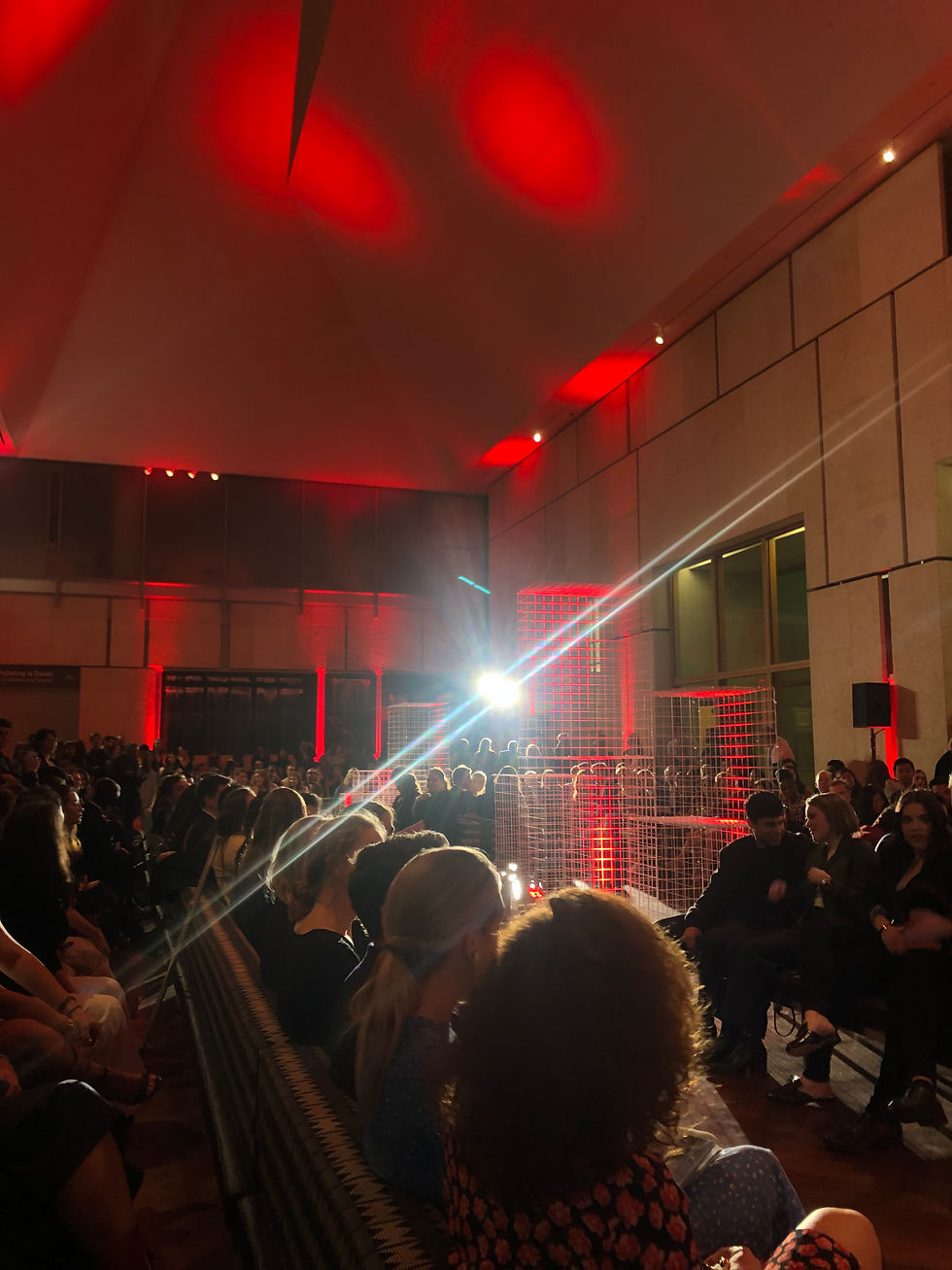Grad BEN 2019
- VP Public Affairs
- Feb 22, 2019
- 5 min read
Updated: Mar 18, 2019
The 2019 GradBEN Talks got off to a great start in the early afternoon on Friday, February 22nd. Held in the Amado Recital Hall in Penn’s Irvine Auditorium, the event saw a larger attendance than that of previous years, with members of the public, students from the School of Arts and Sciences (SAS), the College of Liberal and Professional Studies (LPS), and even those from schools in Engineering and Medicine in attendance to support and listen to their colleagues. Throughout the afternoon, the judges and audience mingled while speakers prepared to give their 8-minute TED Talk style presentations, and an assortment of snacks ranging from sushi and dumplings to empanadas and veggie rolls were available during the event’s breaks and included vegan and vegetarian options. Take a look below for some of the highlights of each of the four panels of the GradBEN Talks.
Professional Masters
During the first panel for the 2019 GradBEN Talks, our speakers tackled topics ranging from Psychology to Behavioral & Decision Sciences. Masters students from the College of Liberal and Professional Studies (LPS) posed difficult questions about how we can improve dynamics within organizations as well as society as a whole. Rae Childs in Liberal Arts gave an interesting and timely talk on what narcissism really means from a psychological perspective, touching on what happens when the basic need for external validation is taken too far. In doing so, she also shared healthy coping methods that we can strive for, including how intellectualizing our problems may be a better path toward self-actualization. Tirth Manek in Organizational Dynamics brought out the audience’s smiles and laughter while sharing what he has learned about stand-up comedy as both a comedian and academic. He presented stand-up as one way speakers can engage their audience while also being sympathetic to the audience’s specific interests or needs. The winner of the $500 cash prize for the Professional Masters category was Connor Joyce in Behavioral and Decision Sciences, who gave a talk on Automation’s effect on human-powered work. Our first panel definitely shed light on what makes people tick, and how this knowledge can benefit society on a variety of levels.
Social Sciences
This year we saw amazing representation from all the social sciences! From the fascinating discussion of slavery and citizenship in Brazil by Sociology PhD student João Victor Nery Fiocchi Rodrigues, to interrogating correlations between police numbers versus prisoner numbers by Criminology PhD student Jacob Kaplan, the social sciences panel displayed a diversity of discussions about people and society. Highlights include an incredible talk by Anthropology PhD student Alexandra Kralick entitled “What our Skeletons Say About the Sex Binary (*hint, there is a lot of interesting gray area!). Alexandra’s discussion explained why these gray areas were for so long unacknowledged, and how important they are for understanding human diversity. Sociology PhD student Angela Simms gave a wonderfully compelling discussion which she titled “How to Protect your Middle Class Status: Lessons from the Black American Experience” and which addressed the idea that if we want to foster the middle class, we must nourish it by voting for higher taxes. A huge congratulations to all of our Social Sciences participants on their inspiring talks, and congratulations also to the category’s winner, Sociology PhD Yun Cha, for his discussion “Who do Graduate Degree Holders Marry? How the Separation of Advanced Degrees Affects Our Understanding of Trends in Education Homogamy."
Humanities
The humanities component of the GradBEN Talks incorporated a variety of engaging presentations, ranging from the moral failures of racial stereotypes as presented by Philosophy PhD student Youngbin Yoon, to South Asia Studies Masters student Annalysse Mason’s presentation on the politics of sex reassignment surgery in the Islamic Republic of Iran. The presentations from the humanities displayed an impressively keen eye to the intersections between the arts and sciences. For instance, Roksana Filipowska, a PhD student in History of Art, expanded uponthe material realities of plastics in art preservation, and Classical Studies PhD Student Julia Simons gave a fascinating talk on the position of hunchbacks in the medical imagination of people in the classic era. The winner of the Humanities section was Gregory Callaghan, a PhD student in Ancient History whose presentation on Hellenistic international relations entitled “If You Can't Walk the Walk, Then Talk the Talk: Status and International Relations in the Hellenistic World,”highlighted the tangible political application of the presentation of one’s status from antiquity to the present.
Natural Sciences
For the last portion of event, representatives from Physics and Astronomy, Biology, and Chemistry presented findings from their current research. The talks were widely accessible to the non-specialists in the room given their emphasis on the interactions between the natural sciences and society, technology, and human behavior. Paul Masih Das, a PhD student in Physics and Astronomy and winner of the Natural Sciences category, gave a talk called “Quantum Materials: Making Smartphones ‘Cool’ Again.” The presentation focused on how certain technologies can make smartphones and other electronic tablets and devices more efficient by cutting the amount of energy they require to function, as well as preventing them from overheating by overworking (we have all heard the stories about a certain brand of phones bursting into flames!). Later on during the panel, Asja Radja, also a PhD student in Physics and Astronomy, took a unique approach to understanding how pollen affects people based on the specific pattern of pollen cells and presenting what would normally be a topic in biology through the lens of a physicist. To wrap up the natural sciences section, Emile Kraus gave an informative talk on how sea sponges react while under pressure, calling it “The Physics of SpongeBob.” Not only did the audience learn a lot, they also laughed a fair amount as Kraus put a fun and entertaining twist on the presentation by working in allusions to the well-known sea-sponge from Bikini Bottom.
All in all, this year’s rendition of the GradBEN Talks, an annual event bringing students, faculty, and the greater Penn and Philadelphia public together for a knowledge-filled afternoon, was a success. The audience also participated in determining who out of all of the contestants would go home with the Audience Choice Award. By the end of the day, and by popular vote, the winner was Professional Masters student Lorena Levano in Behavioral and Decision Sciences, who gave a talk on “Sexual Harassment in High Schools From a Social Norms Perspective.” Not only were people watching in the auditorium, but family and friends from afar were also able to tune in thanks to the livestream of the event that was available through the School of Arts and Sciences’ Facebook and Twitter pages. We hope you will join for our next GradBEN Talks in the Spring of 2020.
For videos of the talks by the winners of GradBEN 2019, please visit: https://www.sas.upenn.edu/index.php/grad-ben-talks
For more photos of the events, please visit SASgov’s Facebook page: https://www.facebook.com/pg/UPennSASgov/photos/?tab=album&album_id=2299361833421842
Photos by Weston Bland, Aisha Chughtai, Giulio Genovese, Indivar Jonnalagadda, Brianna Lee, Charlotte Williams, and Brianna Reed.

















Comments